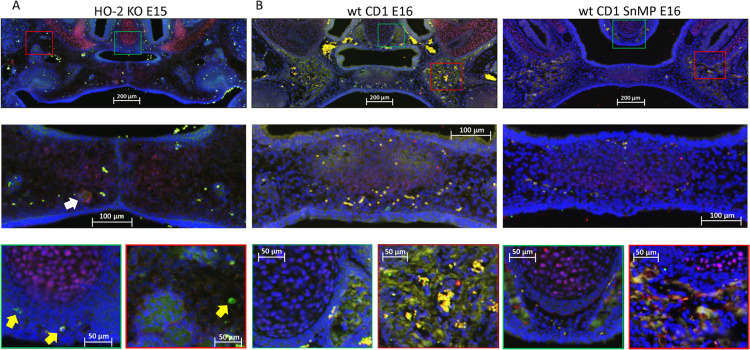FIGURE 10.
Most HO-1 positive cells in the palatal osteogenic centers are not positive for Sox9. (A) Upper panel: Fluorescent histochemical double-stained coronal palatal section for Sox9 (red) with HO-1 (green), representative for the wt E15 and HO-2 KO E15 fetuses, e.g., HO-2 KO E15. Middle panel: Near the disintegrating MES Sox9-HO-1 double-positive-stained cells (white arrow) were sporadically found. Green panel: In the osteogenic centers near the forming nasal septum clusters some HO-1 expressing cells were found. Furthermore, some solitary HO-1 expressing cells (yellow arrow) were found. In the cartilage of the nasal septum, multiple Sox9 expressing cells were found. Red panel: The osteogenic centers in the lateral parts of the fusing palate demonstrated clusters of HO-1 expressing cells, and solitary strong HO-1 expressing cells (yellow arrows) in the mesenchyme. (B) Upper panel: Fluorescent histochemical double-stained coronal palatal section for Sox9 (red) with HO-1 (green), representative for the wt CD1 E16 and wt CD1 SnMP E16 fetuses. Middle panel: In the fusing palate clusters of HO-1, expressing cells were found within the palatal osteogenic centers. Green panel: Near the forming nasal septum clusters of HO-1 expressing cells were found. In the cartilage of the nasal septum multiple Sox9 expressing cells were found. Red panel: The osteogenic centers in the lateral parts of the fusing palate demonstrated clusters of HO-1 expressing cells.

